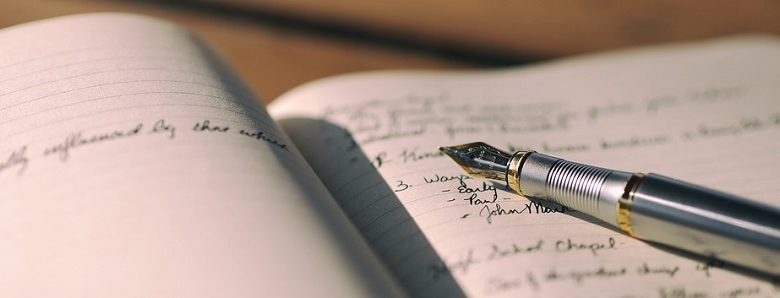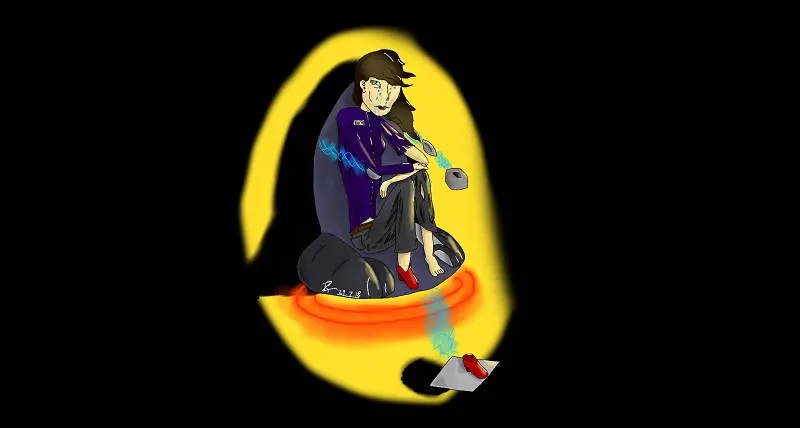
Disability short story series: Designer Genes
We don’t think that there are enough books with disabled characters as the hero or heroine. So, we’ve decided to create some of our own. Disabled writer Hayleigh Barclay and disabled illustrator Philip Hoare have come together for Disability Horizons to create a series of drawings and short stories where a disabled person is the lead. The second, Designer Genes…
“When is the baby due?” asked the cashier.
“I’m not pregnant,” said Maria. “I’m just bloated and eat too many doughnuts.” The cashier let out a nervous laugh.
“I’m kidding,” Maria smiled. “No, I’m just shopping for a gift for a pregnant friend.”
The cashier pointed to a row of giant teddy bears sitting high upon a shelf. “These are proving very popular. Limited edition, and specially made for cherubs born in 2065. Gender neutral, of course.”
Maria smiled. “Could you pass me one down?”
Without hesitation, the cashier lifted one of the toys and handed it to Maria. As it sat on her lap, she stroked its white furry paws and, with a tinge of hope and sadness, imagined what her own future might bring. Nappies, midnight feeds, sleepless nights, first words and first day at school. One day, perhaps.
“Would you like me to gift wrap it?” said the cashier, interrupting Maria’s daydream.
Maria nodded. Minutes later she was leaving the shop with the large shopping bag, full to the brim with a stuffed teddy, hung over her wheelchair.
***
Callum opened the front door and handed his girlfriend a glass of gin and tonic, saying; “thought you might need this.”
“Thanks,” Maria said, entering the house and taking a large gulp. “Bloody weekend drivers.”
“Did you get a present?” Callum asked, jumping onto the couch and switching on the TV.
“Yeah,” she replied.
Callum lowered his head and pretended to be engrossed in a reality show about an ex-beauty pageant winner turned celebrity lawyer. Noticing the deep frown lines across his forehead, Maria moved to be beside him.
“What’s up?” she queried.
“You know what,” Callum replied.
Maria sighed. “Don’t start, not tonight.” As she manoeuvred her chair to leave, Callum handed her his phone.
“But I’ve been looking into it,” he said.
Opening the internet app, Maria browsed through the history, before rolling her eyes and handing the phone back to Callum. “I know all about so-called designer babies and the controversies,” she said.
“It’s not called that,” Callum replied, standing up and following Maria into the kitchen. “It’s genetic reconstruction.”
“I know what it’s called,” Maria said. “There’s a lot to consider though.”
“We’ve been planning for a baby since last summer,” Callum said exasperatedly. “And I know the only thing stopping you is that you don’t want to pass on your condition.”
Maria removed the pork chops from the fridge and sat them on the counter. “No parent would,” she said.
“So what are we waiting for?”
Maria passed a bag of potatoes to Callum. “Can you start peeling those?”
He prised open the bag and placed the potatoes in the automatic peeling system – none of those handheld peelers that their grandmothers used to use. Things had changed in the past fifty years. There had once been things called Netflix, Tinder and Google. It was a primitive time.
Maria and Callum sometimes watched history documentaries and wondered how people managed to live. Nowadays, world hunger no longer existed thanks to genetically modified foods, droughts were a thing of the past as global warming had been avoided, and medical science could eradicate any illness or condition by removing or substituting faulty genes.
After several minutes of awkward silence, Callum turned to Maria. “You know it’s completely safe.”
“Oh, I know,” she smiled. “And I know it’s a good thing.”
“But?”
Maria sighed, looking at the baby shower invitation stuck to the fridge. “It’s just… my mother didn’t have me treated. I’m wondering why.”
“Maybe you should speak to her.”

***
Ruby stood in the dressing room of Blossomdales, trying on a purple and pink kaftan. She looked into the hologram mirror, admiring the latest round of Botox she’d had injected around her eyes.
“You know I used to have one of these the fourth time they came into fashion,” Ruby said.
“Uh huh,” Maria replied.
“Did you get a present for your sister’s baby shower?”
“Yeah, I got her a giant teddy.”
“That’s… original.”
Maria took a deep breath, trying to ignore her mother’s sarcasm, and checked the time on her personal assistant watch.
Ruby emerged from the dressing room and twirled. “What do you think?”
“It’s lovely mum,” said Maria, knowing she had already bought something similar. She felt less than thrilled at the prospect of having to search for another new outfit – but said nothing anyway.
As Ruby fidgeted with her sleeves, she spied her daughter biting her bottom lip. “Out with it,” she demanded.
Maria knew there was no point hiding anything from her mother – she could read her like a book. “Callum and I have been talking again about trying for a baby.”
“Well, it’s about time. You’re not getting any younger.”
Maria held her tongue and reminded herself that age is just a number. Really, it is. She paused, drummed her fingers on her armrests, and braced herself. “Why didn’t you have my genes restructured before you had me?”
Ruby sighed and re-entered the dressing room. “I don’t see the point in this conversation. You are perfect just the way you are.”
“Don’t you regret the sacrifices you’ve had to make to look after me?” Maria said. “Your life could have been much simpler.”
“I won’t dignify that with an answer,” she rebuffed.
Before Maria could reply, an assistant marched into the room and offered the two women glasses of champagne. Within seconds Ruby’s arm emerged from behind the curtain and took a glass from the tray.
The assistant walked away with a saccharine smile. Maria held her breath and plucked up the courage to challenge her mother again. “Do you not think my life would be easier if you’d done it?”
“Everyone has their own struggles in life,” Ruby said. “The doctor’s appointments, the operations, the medication and the chronic pain. You’ve coped very well with it all,” Ruby replied, reappearing wearing another dress. This time it was an orange floral number which clashed hideously with her fake tan. “It builds character.”
“And what about the other things?” Maria enquired. “People staring, the bullying, the fact I can’t go on a night out without planning ahead to see if the place is accessible.”
Ruby looked into the mirror and shook her head. “This is awful,” she muttered under her breath and rushed back into the dressing room. “I think you are being very negative considering all you have achieved,” she said, putting on another dress. “Anyway, for your information, you shouldn’t need to be tampered with like some science experiment for people to accept you.”
Maria tried to stifle a laugh. “Science experiment?” she said. “What did you expect? A Frankenstein baby? It’s a perfectly viable medical process. It’s not like the ‘designer genes conspiracy’ that the scaremongers’ plaster all over the internet.”
Ruby poked her head out the side of the curtain. Frowning, she said; “has it ever occurred to you that it’s society the needs to change its attitude about disability? Not disabled people.”
“Are you actually asking me that?” Maria said, raising her voice a little higher than she intended. “I’m the one who’s been living it.”
Ruby stepped out wearing, yet again, another dress which was not only horrific but an abomination to the fashion industry. “Not that one,” Maria snapped.
Ruby huffed, turned around and pulled the curtain behind her. “It sounds like you’ve already made up your mind.”
Maria put her hands behind her head and stared up at the ceiling in search of divine inspiration. “I have to think about what’s best for the child.”
“And you think I didn’t?” Ruby said.
“I didn’t say that,” Maria replied, exasperated. “But, is it fair for me to pass on a condition that will affect their entire life? One simple procedure and the condition can be wiped out from the family completely. My children and grandchildren wouldn’t have to worry about passing it on, ever.”
“It’s called erasure!” Ruby shouted. “If you do this, then you are saying it’s better to get rid of disability than to understand and adapt to it. What kind of message does that send?”
“I know,” Maria groaned. “I don’t know what to do anymore.”
“And remember,” Ruby continued; “nature always wins. If you erase one faulty gene, eventually, down the generations, another one will just replace it.”
Maria sat, unable to answer. As the dressing room fell silent for what felt like hours, neither of the two women spoke. The assistant re-entered the room and informed them the shop was about to close. Ruby left without a dress and Maria without an answer.
But before the two women parted ways, Maria faced her mother. “This isn’t about society, or weird science experiments, or nature proving a point,” she said. “This is about my child and their future.”
***
About an hour later, Maria met Callum outside the supermarket. 10 minutes later they were busy selecting their usual groceries, which Maria meticulously ticked off the shopping list. It was the same routine week after week. Neither of them knew why they felt the need to discuss the option of buying different produce every time they went shopping – because they never did.
“How did it go with your mum?” Callum asked.
“I’m sure you can guess,” Maria replied, giving him a sideways glance that he knew all too well.
“It doesn’t matter,” Callum said as they turned into the pharmacy aisle; “this is our decision.”
Maria nodded and stopped beside a row of pregnancy test kits. She examined them all before placing one in the shopping trolley. She knew, no matter what, she’d need it one day.
Story by Hayleigh Barclay and illustration by Philip Hoare
You can follow Hayleigh on Twitter @HayleighBarclay and Disability Horizons @DHorizons.
More from Disability Horizons…